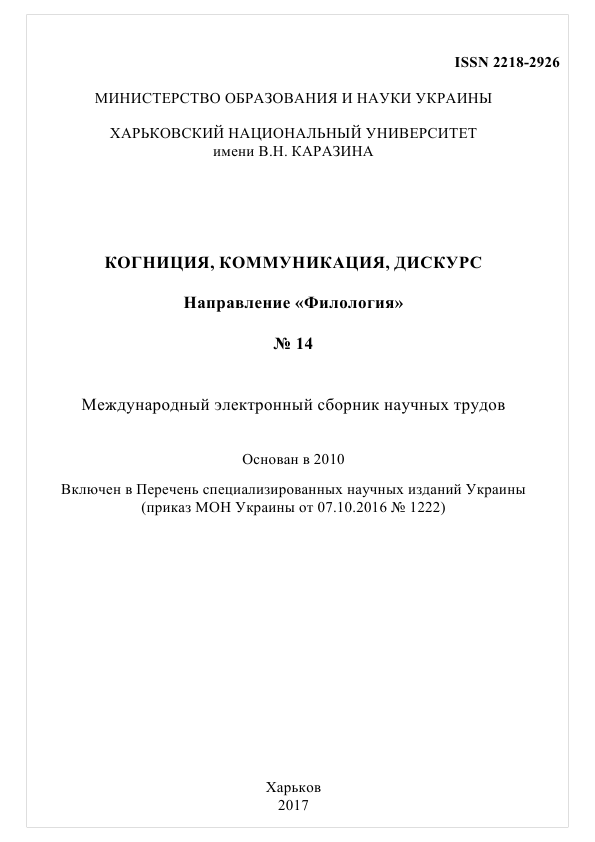Indirect Speech Acts via Conversational Implicatures and Pragmatic Presuppositions
Abstract
This paper investigates the correlations between conversational implicature, pragmatic presupposition and indirect act illocution as relying on the acts’ «idiomacity vs. inferentiality» and “transposition vs. non-transposition”. I will argue that the meaning of conversational implicatures and indirect acts’ illocution relies on situational presuppositions while interpersonal presuppositions determine the choice of directness or indirectness and their coding in accordance with conventional-communicative presuppositions. In addition to the primary and literary illocution, the article introduces the notion of additional illocution that extends the indirect act’s meaning without changing its illocutionary type. Correspondingly, the primary illocution, which changes the act’s illocutionary type, is viewed as the constituent of transposed acts while additional illocution is appropriate for non-transposed acts. Inferential indirect acts involve two types of relations between illocutions and conversational implicatures,which depends on the acts’ transposition vs. non-transposition criteria. In transposed acts, the primary illocution mostly relies on conversational implicature while additional illocution of non-transposed acts relates to implicature through the latter content contribution to speech act’s felicity conditions.Downloads
References
Allan, K. (1997). Indirect Speech Acts. In: Peter V. Lamarque (Ed.). Concise Encyclopedia of Philosophy of Language (pp. 401–403). United Kingdom: Elsevier Science Ltd.
Asher, N., & Lascarides, A. (2001). Indirect speech acts. Synthese, 128, 183–228.
Bellow, S. (1970). Herzog. New York: Fowcett Crest Book.
Bellow, S. (1982). The Dean’s December. New York: Harper and Row.
Dijk, T.A. van (1976). Pragmatics, presuppositions and context grammars. In: S.J. Schmidt (Ed.). Pragmatik (pp. 53–82). Munich: Fink.
Dijk, T.A. van (2008). Discourse and Context: A Socio-Cognitive Approach. Cambridge, New York: Cambridge University Press.
Dijk, T.A. van (2012). Discourse and Knowledge: In J.P. Gee & M. Handford (Eds.), Handbook of Discourse Analysis (pp. 587–603). London: Routledge.
Gordon D., & Lakoff G. (1975). Conversational Postulates. In: P. Cole, & J.L. Morgan (Eds.). Syntax and Semantics 3: Speech acts (pp. 83–106). New York: Academic Press.
Grice, H.P. (1975). Logic and conversation. In: P. Cole, & J. Morgan (Eds.). Syntax and semantics 3: Speech acts (pp. 41–58). New York: Academic Press.
Grice, H.P. (1989). Studies in the Way of Words. Cambridge, Massachusetts: Harvard University Press.
Horn, L.R. (2007). Toward a Fregean pragmatics: Voraussetzung, Nebengedanke, Andeutung. In: I. Kecskes, & L.R. Horn (Eds.). Explorations in Pragmatics: Linguistic, Cognitive, and Intercultural Aspects (pp. 39–69). Berlin: Mouton de Gruyter.
Lakoff, G. (1975). Pragmatics in Natural Logic. In: E. Keenan (Ed.). Formal Semantics of Natural Language (pp. 253–286). Cambridge: Cambridge University Press.
Leech, G.N., & Thomas, J. (1990). Language, Meaning and Context: Pragmatics. In: N.E. Collinge (Ed.). Encyclopedia of Language (pp. 173-206). London: Routledge.
Levinson, S.C. (1983). Pragmatics. Cambridge: Cambridge University Press.
Levinson, S.C. (1987). Minimization and conversational inference. In: M. Bertuccelli Papi, & J. Verschueren (Eds.). The pragmatic perspective: Selected papers from the 1985 International Pragmatics Conference (pp. 61–129). Amsterdam & Philadelphia: Benjamins.
Levinson, S.C. (2000). Presumptive Meanings: The Theory of Generalized Conversational Implicature. Cambridge: MIT Press.
Lincoln, Y.S., & Guba, E.G. (1985). Naturalistic inquiry. Newbury Park, California: Sage.
Maugham, W.S. (1982). Collected Short Stories. New York: Penguin Books.
Mey, J.L. (2001). Pragmatics: An Introduction. Oxford: Blackwell.
Morgan, J. (1978). Two types of convention in indirect speech acts. In: P. Cole (Ed.). Syntax and semantics: Pragmatics (pp. 261–281). New York: Academic Press.
Osisanwo, W. (2003). Introduction to discourse analysis and pragmatics. Lagos: Femolous Fetop Publishers.
President Obama's Speech on Combating ISIS and Terrorism. (2014, September 11). Available from:http://edition.cnn.com/2014/09/10/politics/transcript-obama-syria-isis-speech/index.html
Quayle, J.D. (1992, May 19). Murphy Brown speech. Available from: http://www.vicepresidentdanquayle.com/speeches_ StandingFirm_CCC_1.html
Sadock, J.M. (1972). Speech act idioms. In: P. Peranteau, J. Levi, & G. Phares (Eds.). Papers from the Eighth Regional Meeting of the Chicago Linguistic Society (pp. 329–339). Chicago, IL: Chicago Linguistic Society.
Sadock, J.M. (1974). Toward a Linguistic Theory of Speech Acts. New York: Academic Press.
Salinger, J.D. (1953). Nine Stories. Available from: http://materlakes.enschool.org/ourpages /auto/2013/2/25/50973306/Nine_Stories_by_J_D__Salinger.pdf
Schlenker, Ph. (2008). Be articulate: A pragmatic theory of presupposition. Theoretical Linguistics, 34, 157–212.
Searle, J.R. (1969). Speech acts: An essay in the philosophy of language. Cambridge: Cambridge University.
Searle, J.R. (1979). Expression and Meaning. Cambridge: Cambridge University Press.
Searle, J.R. (1980). What Is a Speech Act? In: A. Pugh, J.V. Leech, & J. Swann (Eds.), Language and Language Use (pp. 312–327). London: Heirman Educational Book & Open University Press.
Searle, J.R., & Vanderveken, D. (1985). Foundations of Illocutionary Logic. Cambridge: Cambridge University Press.
Silverman, D. (2001). Interpreting qualitative data: Methods for analysing talk, text, and interaction. London: Sage Publications.
Simons, M. (2006). Foundational issues in presupposition. Philosophy Compass, 1 (4), 357–372.
Strauss, A., & Corbin, J. (1990). Basics of qualitative research. Newbury Park, London: Sage Publications.
Thomas, J. (1995). Meaning in Interaction: An Introduction to Pragmatics. New York: Longman Group Ltd.
Yule, G. (1996). Pragmatics. New York: Oxford University Press.
Authors, who publish with this journal, accept the following conditions:
The authors reserve the copyright of their work and transfer to the journal the right of the first publication of this work under the terms of the Creative Commons Attribution License (CC BY), which allows other persons to freely distribute a published work with mandatory reference to the authors of the original work and the first publication of the work in this journal.
Authors have the right to enter into separate additional agreements for the non-exclusive dissemination of the work in the form in which it was published by this journal (for example, to post the work in the electronic institutions' repository or to publish as part of a monograph), provided that the link to the first publication of the work in this journal is given.
The journal policy allows and encourages the authors to place the manuscripts on the Internet (for example, in the institutions' repositories or on personal websites), both before the presentation of this manuscript to the editorial board and during review procedure, as it contributes to the creation of productive scientific discussion and positively affects the efficiency and dynamics of citing the published work (see The Effect of Open Access).




